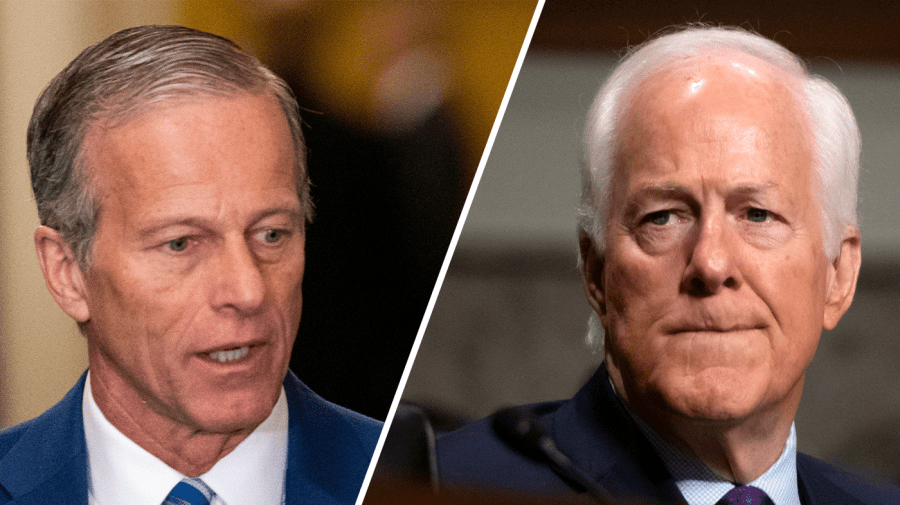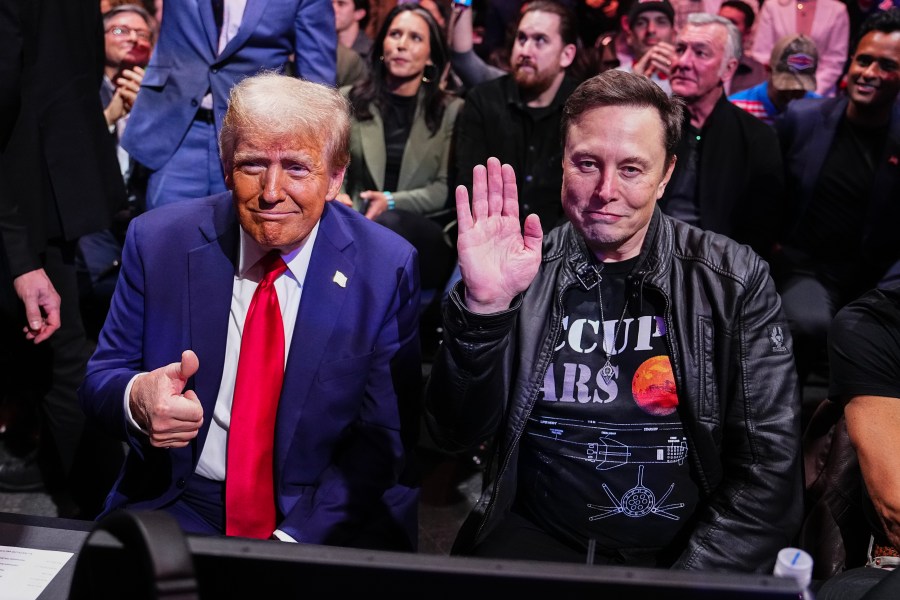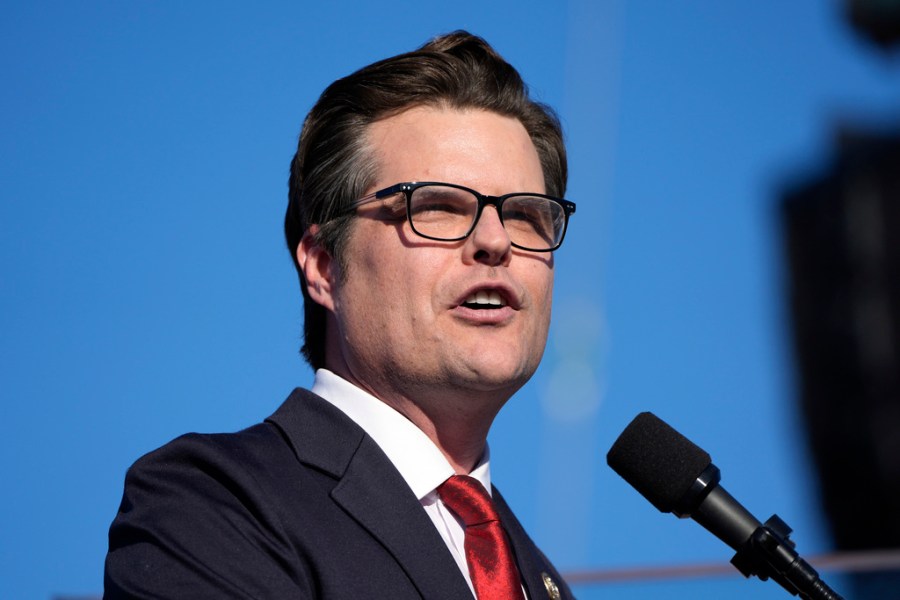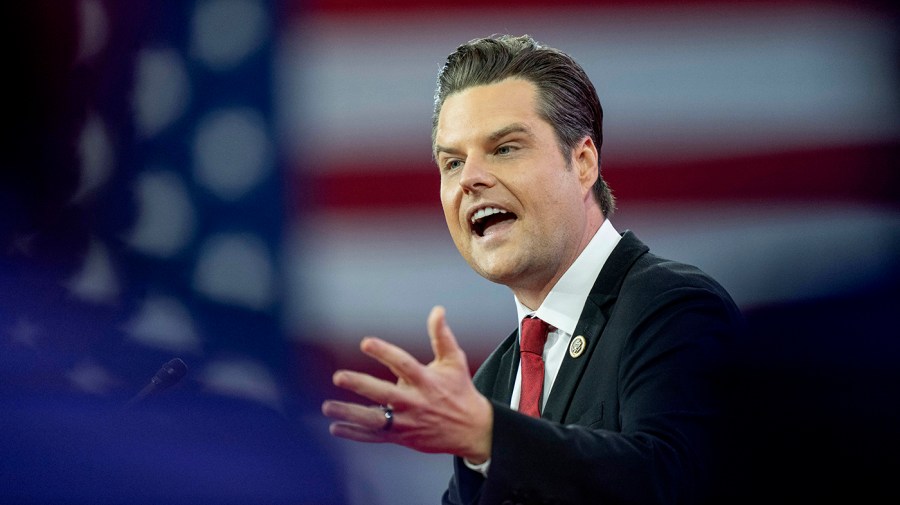
Battle to replace McConnell as Senate GOP leader heats up in final sprint
The temperature is rising in the battle to lead Senate Republicans, with Sens. John Thune (S.D.) and John Cornyn (Texas) facing a one-week sprint to win the top spot after the GOP clinched control of the upper chamber.
According to multiple senators and aides, Thune and Cornyn, along with their allies, have been burning up the phones of members in search of support ahead of next week’s election to replace outgoing Senate GOP Leader Mitch McConnell (Ky.).
Thune, the Senate GOP whip, has been considered a slight favorite to replace the Kentucky Republican. He is the top vote-counter on the GOP side and has proven an able fundraiser and campaigner.
But few are counting out Cornyn, a former whip and top ally to the outgoing leader who is considered to have strong ties with more conservative segments of the conference.
“It’s Thune’s to lose, but Cornyn’s going to make it close,” one GOP aide familiar with leadership dynamics told The Hill. “It’s going to be bloody and rough, and money is going to matter.”
Sen. Rick Scott (R-Fla.) is also once again running for the post but is not expected to survive past the first ballot in what will be a secret tally Wednesday. The vote will only include the members who will be in office once the 119th Congress convenes next year.
The outcome of Tuesday’s election will likely play a key role in who succeeds McConnell.
Thune was consistently on the road in support of Senate GOP candidates throughout October, appearing for all of those in competitive races — save for Kari Lake in Arizona — during the final month, according to a source familiar with the South Dakotan’s operation.
He also raised more than $33 million across his accounts, the National Republican Senatorial Committee (NRSC) and the party’s fleet of candidates, the source added.
Cornyn also posted strong figures, having raked in $26 million, including nearly $12 million for the NRSC, as of late September, while traveling to key battleground states to stump and fundraise in Michigan, Nevada and Indiana, among others.
His team has also noted he has raised $406 million overall since he became a senator in 2002.
But President-elect Trump, who scored a decisive victory in the White House race, remains the biggest X factor heading into next week. Neither Thune nor Cornyn has been a dyed-in-the-wool MAGA backer, but both have sought to repair their relationships with him since the beginning of the year.
Thune has had more work to do on that end than Cornyn after he backed Sen. Tim Scott’s (R-S.C.) presidential campaign and Trump called for him to receive a primary challenge in the Mount Rushmore State. None materialized, and Thune ultimately cruised to a fourth term.
But Thune has appeared determined to be on good terms with the president-elect. According to the same source, the two met at Mar-a-Lago in March and have spoken several times since, including Wednesday.
Another feather in Thune’s cap is that two of his top supporters are Sen. Steve Daines (R-Mont.), the outgoing chair of the Senate GOP campaign arm, and Markwayne Mullin (R-Okla.), a member of Thune’s whip team. Both are key allies of Trump who have been in frequent contact with him throughout the 2024 cycle.
“John Thune’s worked pretty hard at … making sure that he and Trump are on the same page,” Mullin told The Hill in an interview. “He’s done a good job staying relevant to the president, calling him and checking in on him. I think it’s good.”
As for Cornyn, he came out earlier for Trump this cycle and has also maintained a presence with the president-elect, having seen him recently when Trump visited Texas in late October and earlier in the month in Nevada.
Thune indicated to Fox News on Wednesday that he has urged Trump avoid getting involved in the leadership race but noted that it is certainly his “prerogative” if he wants to.
“The president obviously has tremendous influence, and if he chooses to use it, I think, in in the leadership elections, particularly in the Senate … it is a very sort of inside baseball thin,” Thune said. “And the president, if he chooses to, it’s his prerogative to weigh in on that. Frankly, I think if he lets it play out, we’ll get the right person.”
However, Mullin expressed supreme confidence that Thune will take over atop the conference and argued that he already has the votes.
“The way it’s playing out, it’s 100 percent Thune’s at this point. It’s just a formality. I don’t see how Cornyn gets there, and I don’t see how Rick Scott gets there. They’re both good guys, I just don’t see how they get there,” Mullin said. “This leadership election has been going on a long time. … Now, it’s a closing argument and making sure your vote stays where it’s at [and] following up.”
Ever since McConnell announced his imminent departure from leadership, questions bubbled up about whether Daines would make a late entrance and shake everything up in the process, especially if he had Trump’s backing. But Daines has been privately telling senators he’s supporting Thune.
The Montana Republican’s decision only helps Thune that much more, especially as he carries weight with the incoming first-term class, the GOP aide said.
Thune also has some structural advantages. At 63 years old, he is nearly a decade younger than the 72-year-old Cornyn. He also isn’t up for reelection until 2028, while Cornyn is up next cycle and could face a primary challenge from Texas Attorney General Ken Paxton (R), with whom there is no love lost.
“It’s a headache. It’s a distraction. It’s not great timing for Cornyn,” the GOP aide said. “You’re the brand-new leader and all the sudden you’re defending your right flank. He’s cut a lot of deals that have been helpful … but to a lot of Texas primary voters, he hasn’t.”
Chief among them is the Bipartisan Safer Communities Act, which Cornyn negotiated with Democrats in the wake of the 2022 school shooting in Uvalde, Texas — a move that angered some conservatives at home and nationally and drew the ire of Trump himself.
“It will haunt Cornyn in the primary and this leadership election,” the aide continued. “Was it the right thing to do? A lot of people will say yes. It was unpopular, and he made that decision to do the unpopular thing and to put these other aspirations to the side, but it will cost him.”
The vote will also come a day after Sen. Mike Lee (R-Utah) holds a candidate forum. Lee has become a power broker on the right flank as that group seeks widespread changes in how the conference operates in a post-McConnell universe, which Cornyn is likely more on board with.
A second GOP aide noted Cornyn is a consistent presence at the weekly Republican Steering Committee luncheons, which involves many Senate Republicans on the right flank who are pushing those types of reforms.
“Cornyn is more willing to be a reformer probably because he would serve a shorter time period. It’s a meaningful dynamic,” the aide said, adding that he has “a general understanding of existing member frustrations.”
“He’s more willing to change how the conference works.”
One Senate Republican said that while fundraising prowess will play a role, the lion’s share of the discussions among Senate GOP members center on how the leader will manage the conference moving forward.
“What I really hear is, how are the committees going to work? Are we going to get a final product to vote up and down, or are we going to be able to amend it?” one Senate GOP member said, adding that maintaining the filibuster is also important. “It’s the rights of the members and how we’re going to operate.”
“It hasn’t been, ‘Who’s raised the most money?’” the Senate Republican continued. “It’s been, ‘How do we get back operating?’”



